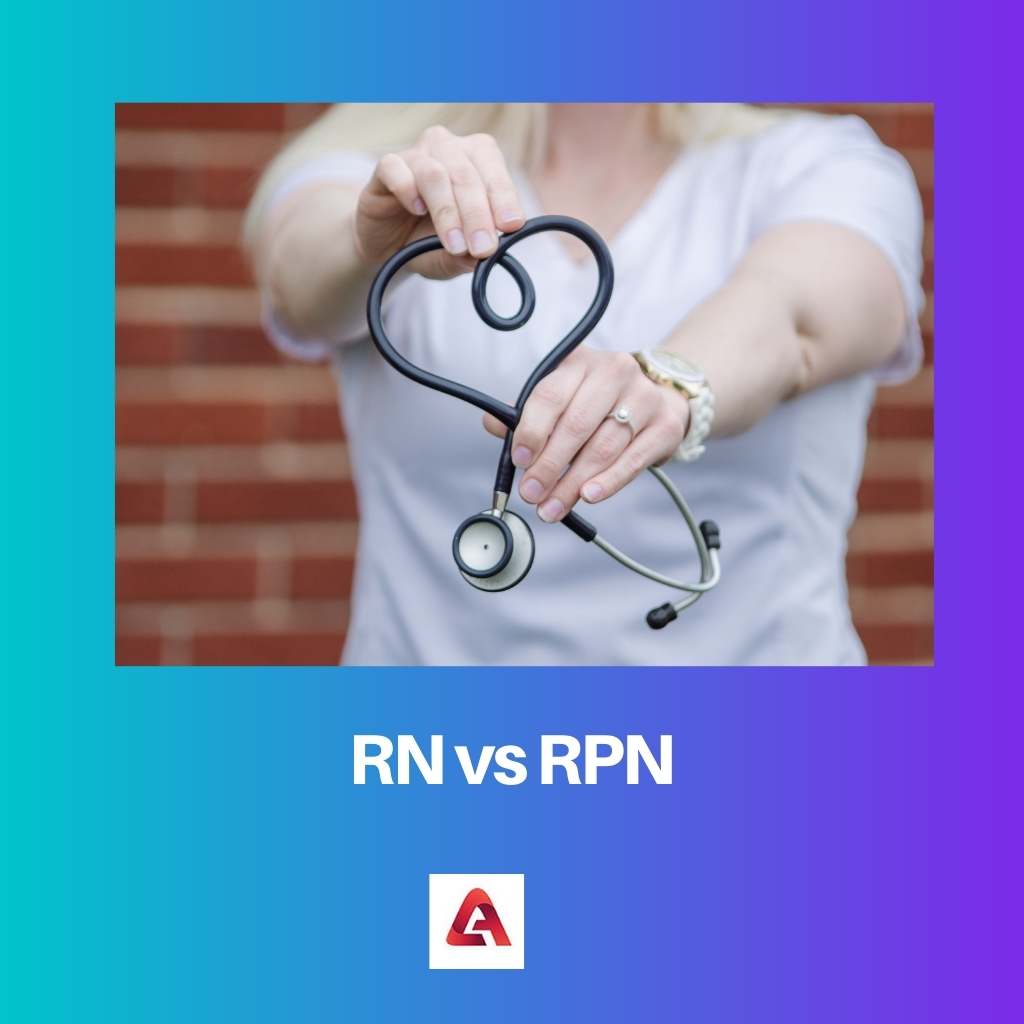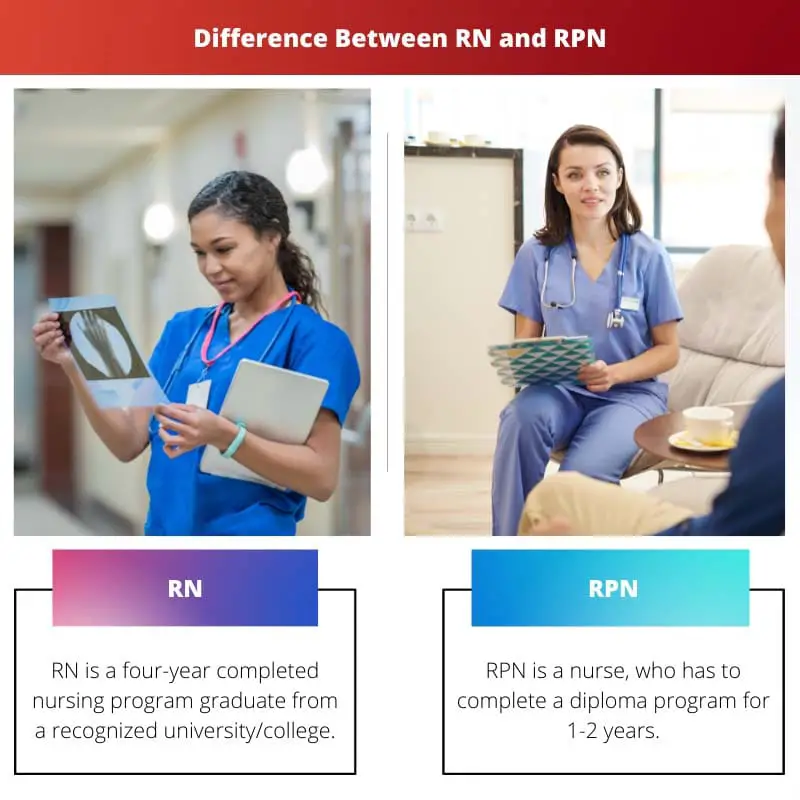RNs have more education (4-year bachelor’s degree) and can provide complete care. RPNs have a 2-year diploma/certificate and provide basic bedside care under RN supervision. Both are registered nurses, but RNs have a broader scope of practice.
Key Takeaways
- Registered Nurses (RNs) complete higher education and training than Registered Practical Nurses (RPNs).
- RNs can provide comprehensive nursing care, including advanced assessments and interventions, while RPNs work within a more limited scope of practice.
- RNs work in acute care settings, while RPNs are more common in long-term care, rehabilitation, and community health settings.
RN vs RPN
RNs (Registered Nurses) have a wider scope of practice and can perform more advanced assessments and procedures. RPNs (Registered Practical Nurses) provide more basic care and work under the supervision of an RN or physician.

The RN is an acronym for Registered Nurse. The role is for nurses who have graduated with a nursing course from a reputed university and are met the eligibility criteria imposed by the government of a country.
The essential qualifications of an RN include an accredited degree, National Council Licensure Examination clearance, and state licensure.
The word RPN is an acronym for Registered Practical Nurse.
It is also known as Licensed Practical Nurse.
They are would-be nurses, who require one or two more years of training in the nursing program, referred to as a diploma, to qualify themselves one step ahead of RPN, a position of a qualified and Licensed Practical Nurse.
Comparison Table
| Feature | Registered Nurse (RN) | Registered Practical Nurse (RPN) |
|---|---|---|
| Education | Bachelor of Science in Nursing (BSN) or Associate Degree in Nursing (ADN) | Diploma in Practical Nursing (1-2 years) |
| Scope of Practice | Broader and more complex – can work in most areas of healthcare, including critical care, emergency departments, and operating rooms. Can perform a wider range of tasks, including administering medications, starting IVs, and developing care plans. | More limited – work in long-term care facilities, community clinics, and doctor’s offices. Perform basic tasks like taking vital signs, assisting with daily living activities, and providing basic wound care. |
| Supervision | Can work independently, although collaboration with physicians and other healthcare professionals is common. | Often work under the supervision of an RN or physician, although some may work independently in specific settings. |
| Salary | Generally higher than RPNs due to additional education and responsibility. | Lower than RNs due to shorter education and narrower scope of practice. |
| Typical work environments | Hospitals, clinics, doctor’s offices, home care, critical care units, operating rooms, intensive care units | Long-term care facilities, community clinics, doctor’s offices, home care, public health settings |
| Licensing requirements | Pass the National Council Licensure Examination for Registered Nurses (NCLEX-RN) | Pass the Canadian Practical Nurse Registration Examination (CPNRE) |
| Continuing education requirements | Varies by state, but requires completing a certain number of continuing education hours every year. | Varies by province, but requires completing a certain number of continuing education hours every year. |
What is RN?
A Registered Nurse (RN) is a healthcare professional responsible for providing comprehensive and compassionate care to patients across various healthcare settings. RNs play a crucial role in promoting health, preventing illnesses, and assisting in the recovery process. Their responsibilities encompass a wide range of tasks, from administering medications to collaborating with other healthcare professionals to develop and implement patient care plans.
Education and Training
To become an RN, individuals need to complete a formal education program, which can include earning an associate degree in nursing (ADN) or a bachelor’s degree in nursing (BSN). Additionally, successful completion of a licensing exam, such as the NCLEX-RN (National Council Licensure Examination for Registered Nurses), is required to obtain licensure and practice as an RN.
Roles and Responsibilities
- Patient Care: RNs are directly involved in patient care, conducting assessments, monitoring vital signs, and administering medications.
- Collaboration: They collaborate with physicians, nurse practitioners, and other healthcare professionals to develop and implement effective care plans.
- Education: RNs educate patients and their families about health conditions, treatment options, and self-care practices.
- Advocacy: Advocating for patients’ rights and ensuring they receive appropriate and ethical care is a key responsibility of RNs.
- Critical Thinking: RNs utilize critical thinking skills to make informed decisions in rapidly changing healthcare environments.
Specializations
Registered Nurses can choose to specialize in various areas such as pediatric nursing, critical care nursing, oncology nursing, or community health nursing, among others. Specializations require additional training and certification.
Career Opportunities
RNs have diverse career opportunities, including working in hospitals, clinics, long-term care facilities, schools, and community health organizations. Advanced practice roles, such as nurse practitioner or nurse educator, may also be pursued with further education and training.
Professional Development
Continual professional development is essential for RNs to stay current with evolving healthcare practices and maintain their licensure. Many RNs pursue additional certifications, attend workshops, and engage in lifelong learning to enhance their skills and knowledge.

What is RPN?
A Registered Practical Nurse (RPN) is a healthcare professional who provides nursing care under the direction of a Registered Nurse (RN), nurse practitioner, or other healthcare team members. RPNs play a crucial role in the delivery of patient care, with a focus on practical and hands-on tasks.
Education and Training
RPNs complete a diploma program in practical nursing, which includes both theoretical classroom instruction and hands-on clinical experience. The curriculum covers various aspects of nursing care, such as medication administration, wound care, and basic assessments.
Scope of Practice
While RPNs share some responsibilities with RNs, their scope of practice is more focused on routine care and less on advanced assessments or critical decision-making. They work in collaboration with RNs and other healthcare professionals to ensure comprehensive patient care.
Settings and Roles
RPNs can be found in various healthcare settings, including hospitals, long-term care facilities, and community clinics. They may work in areas such as medical-surgical units, maternity wards, or rehabilitation centers, contributing to the overall well-being of patients within their scope of practice.
Regulation and Licensing
RPNs are regulated by nursing regulatory bodies in their respective jurisdictions. They must adhere to professional standards and undergo licensing processes to ensure competency and adherence to ethical guidelines in their practice.

Main Differences Between RN and RPN
- Education:
- RNs require a bachelor’s degree in nursing, while RPNs complete a diploma program.
- Scope of Practice:
- RNs have a broader scope, involving advanced assessments, critical thinking, and decision-making.
- RPNs focus on practical care tasks and work under the supervision of RNs or other healthcare professionals.
- Responsibilities:
- RNs take on leadership roles, care coordination, and may specialize in various areas.
- RPNs contribute to direct patient care, handling routine tasks and basic assessments.
- Settings:
- RNs work in diverse healthcare settings, including hospitals, clinics, and community health.
- RPNs are commonly found in settings like long-term care facilities, rehabilitation centers, and community clinics.
- Education Duration:
- RN education is longer, spanning four years for a bachelor’s degree.
- RPN programs are shorter in duration, requiring two to three years for a diploma.
- Regulatory Differences:
- RNs and RPNs are regulated by nursing bodies, with separate licensing and regulatory requirements.
- Career Advancement:
- RNs have more opportunities for specialized roles, leadership positions, and advanced practice.
- RPNs may pursue further education and specialization but within the practical nursing framework.

- https://www.sciencedirect.com/science/article/pii/S8755722311001955
- https://www.sciencedirect.com/science/article/pii/S0260691717300138
Last Updated : 11 February, 2024

Sandeep Bhandari holds a Bachelor of Engineering in Computers from Thapar University (2006). He has 20 years of experience in the technology field. He has a keen interest in various technical fields, including database systems, computer networks, and programming. You can read more about him on his bio page.

Very informative article! It effectively highlights the key differences between RNs and RPNs, providing a clear understanding of the educational requirements, roles, and responsibilities of each. As a healthcare professional, I find this highly beneficial.
This article emphasizes the importance of education and specialization in nursing careers, shedding light on the significance of roles and responsibilities for both RNs and RPNs. A valuable resource for those seeking career growth in the nursing profession.
Absolutely, Robinson! The detailed information about the career opportunities, continuing education requirements, and specializations for both RNs and RPNs is exceptionally insightful and beneficial.
The article presents a comprehensive comparison between Registered Nurses and Registered Practical Nurses. This will certainly help aspiring nurses and those in the healthcare field to better understand the distinctions and make informed career decisions.
Absolutely, Alexa! The detailed breakdown of the education, scope of practice, settings, and responsibilities of RNs and RPNs is incredibly valuable for anyone pursuing a career in nursing.
The article’s detailed description of the roles and responsibilities of Registered Nurses and Registered Practical Nurses serves as a great educational tool for those considering a career in nursing. It provides a thorough understanding of the profession.
The comparison table is extremely useful for professionals and students in the nursing field. It provides a clear and concise overview of the differences between RNs and RPNs, making it easier to grasp the distinctions.
An invaluable resource for individuals who seek to grasp the essential differences in education, scope, and practice between Registered Nurses and Registered Practical Nurses. A well-structured and insightful article.
Yes, indeed! The article effectively delivers the key takeaways and significant aspects of the roles, responsibilities, and career paths of Registered Nurses and Registered Practical Nurses, making it an enriching read for nursing professionals and students.
I couldn’t agree more, Scarlett50! The detailed comparison and the emphasis on the fundamental disparities, educational requirements, and career prospects for RNs and RPNs present a highly informative piece for aspiring nurses.